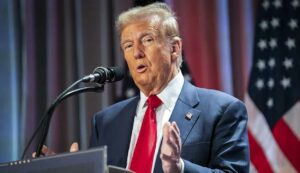Trump appoints Alex Wong, a supporter of tougher approach to China, to next administration
Alex Wong, the deputy national security adviser appointed by President-elect Donald Trump, adds another supporter of a tough stance toward China to the incoming administration.

During Trump’s first term, Wong was the deputy special representative for North Korea, helping to arrange Trump’s meetings with Kim Jong Un, the leader of that nation. “Alex also led the State Department’s efforts to implement the Free and Open Indo-Pacific Strategy,” Trump said when he announced Wong’s selection.
Wong’s appointment comes after Trump appointed several well-known China hawks, such as Rep. Mike Waltz (R-FL) as his national security adviser and Sen. Marco Rubio (R-FL) as his candidate for secretary of state.
Wong characterized China as a country whose progress was mostly driven by taking advantage of the free international system in an October 2023 opinion piece published by the Hudson Institute, a research institution located in Washington, D.C.
“It is instead, more threateningly, dependent on the abuse of the liberal order for continued survival,” Wong said. He listed the Chinese Communist Party’s (CCP) use of intellectual property theft, “coerced international political acquiescence,” internal minority suppression, and the “actualization of territorial claims” as justifications for its control.
The U.S.’s efforts to enforce maritime law in the Indo-Pacific and use its military to “maintain its access to the Indo-Pacific region and peace across the Taiwan Strait,” Wong added, are perceived by Beijing as intentional attempts to contain China and to violate its “territorial integrity.”
“When the U.S. countermoves, the CCP will respond angrily and accuse us of destroying Chinese society. That doesn’t mean we should stop working on our policies,” Wong said. He cautioned that the United States had to be ready for “a level of tension, regional destabilization, and—yes—possible conflict that we have not seen since the end of World War II.”
Wong is a strong advocate for Taiwan, a self-governing democracy that Beijing asserts is its territory and has promised to integrate it eventually, if necessary, by force. When he visited Taiwan in 2018, he addressed the American Chamber of Commerce, “We aim to strengthen our ties with the Taiwan people and to bolster Taiwan’s ability to defend its democracy.”
Soon after Trump signed the Taiwan Travel Act into law, which promoted high-level meetings between U.S. and Taiwanese officials, the trip—which Beijing denounced—took place.
According to Sean King, senior vice-president of the next York business consultancy company Park Strategies, “Mr. Wong’s appointment to Trump’s National Security Council can only be seen as beneficial to Taiwan’s visibility and interests in the new administration,” he told media.